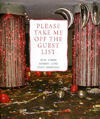Please Take Me Off the Guest List
Please Take Me Off the Guest List is a collaboration between three people: Nick Zinner, of the band Yeah Yeah Yeahs, provides the photographs; Zachary Lipez, of the band Freshkills, provides the essays; and Stacy Wakefield, former design director of Artforum, pulls it all together into a wonderfully designed object. It has already been noted elsewhere how rare it is for the book’s designer to have her name on the cover, but here it is earned. Zinner’s photographs and Wakefield’s design are the true highlights of this collection, which should appeal to anyone interested in book arts. Unfortunately, Lipez’s essays do not measure up to the quality of the photographs and the quality of the design elements.
Please Take Me Off the Guest List is a collaboration between three people: Nick Zinner, of the band Yeah Yeah Yeahs, provides the photographs; Zachary Lipez, of the band Freshkills, provides the essays; and Stacy Wakefield, former design director of Artforum, pulls it all together into a wonderfully designed object. It has already been noted elsewhere how rare it is for the book’s designer to have her name on the cover, but here it is earned. Zinner’s photographs and Wakefield’s design are the true highlights of this collection, which should appeal to anyone interested in book arts. Unfortunately, Lipez’s essays do not measure up to the quality of the photographs and the quality of the design elements.
The first essay in the collection is titled “Boring Coke Stories,” which should indicate the kind of self-deprecation that the reader will come to expect from Lipez as he or she works through these essays. After all, Lipez can’t actually believe the stories are boring. If he does, then why tell them? In this essay he tells a number of short narratives surrounding cocaine use, and before his last “boring coke story,” he writes, “Okay. One more. I’m keeping some for myself so I don’t feel like the sort of person who engages in memoir.” This reluctance to engage in memoir is too bad, because it could be the difference between these stories coming across as anyone’s generic New York City experiences and as stories that are specifically Lipez’s own.
And this criticism applies to the other essays in the collection too. Anyone who has spent time on the Lower East Side or in Williamsburg, Brooklyn in their twenties, or perhaps thirties as Lipez is in now, already knows these stories, already knows people just like those who Lipez depicts, already knows people just like Lipez, or at least just like how he presents himself in these essays. This is not to say that there are not moments where Lipez comes across as witty or sincere, but those moments are few and far between.
In “My Letter of Resignation,” Lipez writes a no-holds-bar letter to his bosses at The Strand, which is something I imagine a lot of people would like to do at some point in their lives— resign from their job, telling the boss what you really think. However, Lipez’s essay is more about his own shortcomings as a worker, including always arriving late and often arriving still drunk from the night before, though he does not see these things as problems. Lipez wryly writes, “My tardiness should have never been an issue, and certainly not one that was brought to my attention.” In this piece, he also offers his view on literary criticism: “My mother birthed me with a certain expectation of disappointment, but she would have to lower the bar considerably before I add literary criticism to the pyramid of disenchantment that I’ve managed to build for her.”
The title Please Take Me Off the Guest List suggests a tiredness, a readiness to move on from these experiences; however, I am not convinced that is the case for Lipez. In “I Like My Metal Like I Like My Women…False,” Lipez writes:
I did not grow up during wartime. I have never, in any real sense, suffered. I know I said I suffered earlier, but I was using dramatic license, or kidding, or lying. I grew up in a state of privileged irritation. I suckled on a tit of brie and always had an unkind word for the school janitor. Truly, I was a shit. Now I read the great books and barely comprehend them. The sad ones make me sad and I hate that there’s no one around to swoon over my sincerity.
He criticizes here his “privileged irritation,” and he seems to half-mock the entitlement he feels to show up to work whenever he wants, still drunk or not, but the overall impression left suggests that he will continue to use dramatic license, to kid, or to lie to himself.





